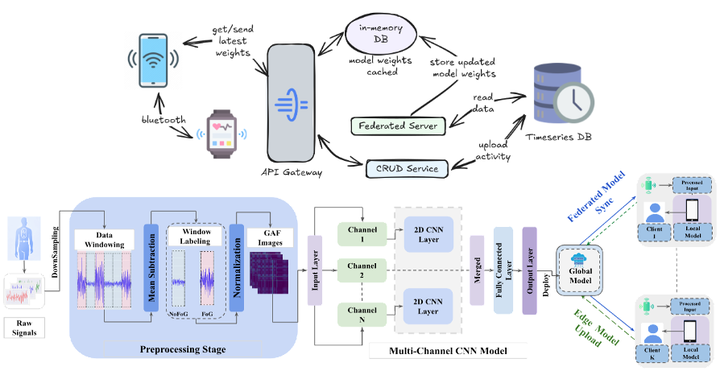Freezing of Gait Detection Using Gramian Angular Fields and Federated Learning from Wearable Sensors

Abstract
Freezing of gait (FOG) is a debilitating symp- tom of Parkinson’s disease that impairs mobility and safety by increasing the risk of falls. An effective FOG detection system must be accurate, real-time, and deployable in free- living environments to enable timely interventions. However, existing detection methods face challenges due to (1) intra- inter patient variability, (2) subject-specific training, (3) using multiple sensors in FOG dominant locations (e.g., ankles) leading to high failure points, (4) centralized, non-adaptive learning frameworks that sacrifice patient privacy and prevent collaborative model refinement across populations and disease progression, and (5) most systems are tested in controlled set- tings, limiting their real-world applicability for continuous in- home monitoring. Addressing these gaps, we present FOGSense, a real-world deployable FOG detection system designed for uncontrolled, free-living conditions using only a single sensor. It uses Gramian Angular Field (GAF) transformations and privacy-preserving federated deep learning to capture temporal and spatial gait patterns missed by traditional methods with a low false positive rate. We evaluated our system using a public PD dataset collected in a free-living environment. FOGSense improves accuracy by 10.4% over a single-axis accelerometer, reduces failure points compared to multi-sensor systems, and demonstrates robustness to missing values. The federated ar- chitecture allows personalized model adaptation and efficient smartphone synchronization during off-peak hours, making it effective for long-term monitoring as symptoms evolve. Overall, FOGSense achieved a 22.2% improvement in F1-score and a 74.53% reduction in false positive rate compared to state-of-the- art methods, along with enhanced sensitivity for FOG episode detection, empowering preventive care and long-term symptom management as Parkinson’s progresses.